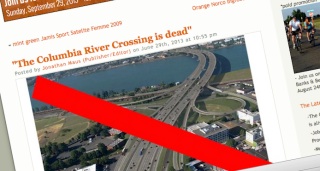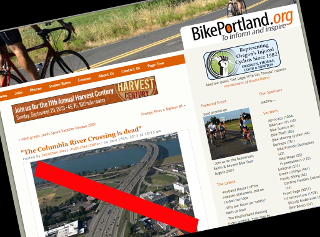
It may be a hot Friday afternoon in the middle of August, but the president of the Oregon Senate has spent it making calls to key legislators, counting votes for a possible resurrection of the Columbia River Crossing.
That’s the latest word from Sen. Rod Monroe (D-East Portland), a longtime backer of the CRC who said a one-day special session that would include a new deal on the big highway-rail project is possible, but not likely.
“I would say right now the chances of a special session are at best 50-50, maybe not even that high,” said Monroe, a former Metro councilor who sits on the Business and Transportation Committee and the special committee regarding the CRC.

Peter Courtney.
Monroe, reached by phone at his home office, said he’d spoken with Senate President Peter Courtney (D-Salem) less than an hour before. “He absolutely does not want to have a special session that would last more than one day without everything agreed to in advance and the votes there,” Monroe said of Courtney.
The CRC would not be the only subject of such a special session, Monroe said — public pension reform and tax increases would be on the table. Monroe said he saw almost no chance that the CRC in itself would be enough to motivate a special session.
Given this situation, it’s possible that a CRC revival, which would be popular with some businesses and labor unions, is being used as a bargaining chip in the effort to assemble the votes for a tax deal.
Last year, Oregon’s legislature used a one-day special session to sign off on a similarly pre-arraged tax lock-in designed specifically for Nike.
As the Willamette Week, Oregonian and Columbian reported two weeks back, the deal to resurrect a project that was declared dead would require rewriting the compromise Oregon legislators resoundingly approved last spring: That Oregon would only borrow $450 million against as-yet-unidentified future revenues if the state of Washington agreed to pay the same.
This summer, Washington’s state Senate narrowly killed that deal, which means that Oregon backers of the Columbia River Crossing are looking for a do-over. Monroe said that with the cooperation of Vancouver’s mayor and Washington’s governor, both of whom publicly back the project, Oregon could put tolls on the bridge itself and send the light rail line across without Washingtonian support. Washington could then choose whether or not to complete the planned highway expansions on its side of the river on its own time.
This workaround would also put Oregonians on the hook for all of any cost overruns.

(D-East Portland)
Monroe said Oregon’s one-day session would have to happen before Oct. 1, when Oregon’s current funding commitment expires.
It remains to be seen whether the federal government would actually put in its $850 million share of a project that was, for more than a decade, pitched as a bi-state solution. Bridge opponent Joe Cortright argued earlier this month that without the Washington-side highway expansions, the project “would differ so substantially from the original proposal that it probably wouldn’t qualify for federal funds,” as the Oregonian reported.
For his part, Monroe said he supports a new highway bridge as long as it also includes a bicycle-pedestrian path, light rail to Vancouver, and tolls of perhaps $2 to $3 per car for people crossing the bridge.
Those three factors are “an absolute quid pro quo,” Monroe said. “I don’t support the project without it. … And if I don’t support the project, I think I could control enough Democratic votes that we could stop it.”
It’ll be interesting to see how other Democrats, especially Portlanders whose votes for the CRC plan were more reluctant than Monroe’s, will be handling this unusual situation. You can let them know your own feelings here.

